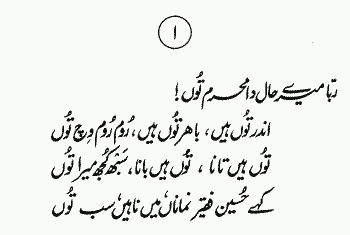Naveed Hussain
Shah Hussain, a 16th-century Sufi mystic and poet from Punjab, occupies a unique space in the literary landscape of the Indian subcontinent. His poems, known as “kafs”, are not mere verses but vibrant tapestries woven with profound spiritual insights, earthy humor, and passionate longing for the divine. To understand Shah Hussain’s poetry is to delve into the very soul of Punjabi mysticism, where everyday life becomes a metaphor for the journey to God.
At the heart of Shah Hussain’s poetry lies the concept of “Ishq” – an all-encompassing love for the divine. This love transcends earthly desires and societal constraints, driving the poet on a passionate quest for union with the Beloved. He sings of separation and longing, of burning desire and ecstatic joy, using imagery drawn from everyday life – the churning of butter, the gurgle of the river, the chirping of birds – to illustrate the complexities of the mystical experience.
One of the hallmarks of Shah Hussain’s poetry is his seamless blending of the mundane and the mystical. He effortlessly moves between the everyday world of farmers and weavers, lovers and kings, and the realm of divine love and cosmic consciousness. This juxtaposition creates a unique tension and depth, reminding us that the divine is not confined to temples and mosques but permeates every aspect of existence.
Unlike many Sufi poets who focus on sobriety and seriousness, Shah Hussain embraces humor and playfulness as tools for spiritual growth. He uses witty puns, playful metaphors, and even bawdy jokes to challenge societal norms and conventions, stripping away our self-importance and opening us to the transformative power of laughter. His poetry reminds us that on the path to enlightenment, joy and lightheartedness are just as crucial as introspection and contemplation.
Please, subscribe to the YouTube channel of republicpolicy.com
Shah Hussain’s poetry is deeply rooted in the Punjabi language and folk traditions. He eschews the elitist language of Persian, instead choosing the earthy, vibrant tones of his native tongue. This deliberate choice makes his poetry accessible to the common folk, resonating with their lived experiences and aspirations. His verses are often sung and danced to, blurring the lines between poetry, music, and ritual, creating a truly participatory experience of the divine.
Shah Hussain’s poetry continues to inspire and challenge readers centuries after its creation. His words offer a map for navigating the complex terrain of the human spirit, urging us to embrace love, laughter, and a deep connection with the divine. His legacy transcends the boundaries of religion and culture, offering a universal message of hope, transformation, and the enduring power of human yearning for the ultimate truth.
In conclusion, Shah Hussain’s poetry is not simply a collection of verses; it is a vibrant tapestry of the human spirit in its pursuit of the divine. By embracing humor, everyday life, and the vernacular, he invites us to see the world through mystical eyes, where the mundane becomes sacred and the path to enlightenment lies within the very fabric of our existence. His words continue to resonate today, reminding us to embrace love, laughter, and the unwavering pursuit of the ultimate truth.
Please, subscribe to the monthly magazines of republicpolicy.com

















